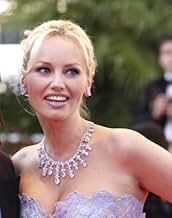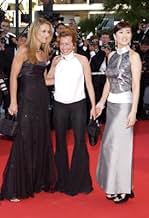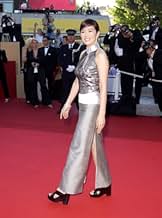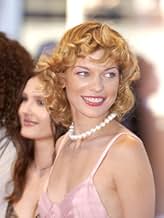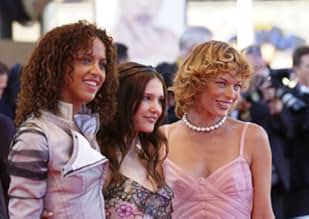CALIFICACIÓN DE IMDb
6.4/10
1.3 k
TU CALIFICACIÓN
Agrega una trama en tu idiomaRosanna Arquette talks to various actresses about the pressures they face as women working in the entertainment industry.Rosanna Arquette talks to various actresses about the pressures they face as women working in the entertainment industry.Rosanna Arquette talks to various actresses about the pressures they face as women working in the entertainment industry.
- Dirección
- Guionista
- Elenco
- Premios
- 1 nominación en total
- Dirección
- Guionista
- Todo el elenco y el equipo
- Producción, taquilla y más en IMDbPro
Opiniones destacadas
Age is an actress worst nightmare, or so it appears to be the case that Rosanna Arquette explores in her interesting documentary "Searching for Debra Winger". In fact, most actresses working in movies seem to have a sort of "shelf life" while they are young and beautiful, then, after that, it's oblivion, at best.
As Martha Plimpton points out, most actors working in films have a lot more options than actresses. Jack Nicholson and others of his age group, still active, are the examples. For every Meryl Streep, there are a hundred Debra Wingers that could still be working in meaningful projects, yet, little work seems to come their way, unless they look toward movies made for television.
Rosanna Arquette has a sharp eye to delve into the subject and her choice of people she interviews for us is quite remarkable. Unfortunately, Hollywood always will make films for a younger audience. Maturity and acting abilities seem not to matter much in that factory of dreams.
As Martha Plimpton points out, most actors working in films have a lot more options than actresses. Jack Nicholson and others of his age group, still active, are the examples. For every Meryl Streep, there are a hundred Debra Wingers that could still be working in meaningful projects, yet, little work seems to come their way, unless they look toward movies made for television.
Rosanna Arquette has a sharp eye to delve into the subject and her choice of people she interviews for us is quite remarkable. Unfortunately, Hollywood always will make films for a younger audience. Maturity and acting abilities seem not to matter much in that factory of dreams.
Roseanne Arquette's personal documentary has a really great idea: several dozen top Hollywood actresses from the 70's, 80's and 90's discuss the difficulties facing women in Hollywood, particularly women over the age of forty. Interviewing them one-on-one or gathering them together in discussion groups, Arquette elicits refreshingly frank, unsanitized criticisms and confessions from some of Hollywood's outstanding actresses and beauties: Jane Fonda, Holly Hunter, Daryl Hannah, Salma Hayak, Angelica Huston, Meg Ryan, Sharon Stone, and many others including Debra Winger (who looks fabulous). The title takes its name from the idea that Winger chose to leave Hollywood at the height of her career in the 80's (though a quick check on IMDb.com shows that the actress has actually worked continuously since then.)
Roger Ebert provides a plausible - though unchallenged - explanation for the lack of good roles for women in their 40's. The audience, he explains, is thought to be comprised of young men 14-24 years old who are disinterested in films about women who might be the age of their mothers. Salma Hayak proposes a solution: she suggests that it will take powerful Hollywood women - like the ones interviewed in this documentary - to create more interesting opportunities for mature women in film.
The lack of meaningful roles for women, particularly mature women is a worthwhile subject and naturally has implications far beyond Hollywood; but Arquette's inquiry is disappointingly shallow. The documentary neglects the broader issues of our obsession with youth and beauty and women's role in society focusing exclusively on the impact of aging on Hollywood stars. (The choppy, MTV editing style and amateurish camera-work don't do a lot to elevate the topic either. But those are minor annoyances.)
At its worst, the film disintegrates into a kind of group kvetch for the over privileged. And watching these beautiful, wealthy women preen in front of paparazzi, compare jewellery, schedule dinner dates and party plans then complain that they don't have enough time to spend with their kids, well, it's kinda hard to feel a ton of sympathy....unless you, too, just happen to be a gorgeous, wealthy forty year old movie star. The irony is there for all to see but is never acknowledged: most of these actresses have clearly benefitted from the system they're now deploring; in their twenties, weren't these actresses eclipsing the previous, aging generation? So the laments come off as self-serving.
Despite these disappointments, SFDW is worth a look for its candid interviews. Debra Winger, Whoopi Goldberg and Jane Fonda are particularly good. Recommend.
Roger Ebert provides a plausible - though unchallenged - explanation for the lack of good roles for women in their 40's. The audience, he explains, is thought to be comprised of young men 14-24 years old who are disinterested in films about women who might be the age of their mothers. Salma Hayak proposes a solution: she suggests that it will take powerful Hollywood women - like the ones interviewed in this documentary - to create more interesting opportunities for mature women in film.
The lack of meaningful roles for women, particularly mature women is a worthwhile subject and naturally has implications far beyond Hollywood; but Arquette's inquiry is disappointingly shallow. The documentary neglects the broader issues of our obsession with youth and beauty and women's role in society focusing exclusively on the impact of aging on Hollywood stars. (The choppy, MTV editing style and amateurish camera-work don't do a lot to elevate the topic either. But those are minor annoyances.)
At its worst, the film disintegrates into a kind of group kvetch for the over privileged. And watching these beautiful, wealthy women preen in front of paparazzi, compare jewellery, schedule dinner dates and party plans then complain that they don't have enough time to spend with their kids, well, it's kinda hard to feel a ton of sympathy....unless you, too, just happen to be a gorgeous, wealthy forty year old movie star. The irony is there for all to see but is never acknowledged: most of these actresses have clearly benefitted from the system they're now deploring; in their twenties, weren't these actresses eclipsing the previous, aging generation? So the laments come off as self-serving.
Despite these disappointments, SFDW is worth a look for its candid interviews. Debra Winger, Whoopi Goldberg and Jane Fonda are particularly good. Recommend.
I wanted to like this movie, I really did, but it's a mess. As well-intentioned as is Roseanna Arquette, there's no real point to this film.
Obviously, Arquette was able to secure the confessions of some of the finest actresses of our times, but instead of drawing on the "Red Shoes" theme, we are subjected to an inchoate collection of let's face it, silly laments.
Though not meant to be, a lot of these diatribes are insulting to women who struggle along in boring jobs, barely able to make ends meet while juggling marriages, kids and art without benefit of nannies, private jets and personal assistants.
Instead of discussing the struggle of art v. children, or career v. marriage as was promised in the opening monologue, this movie is about extraordinarily beautiful women who want our sympathy because they no longer receive the enormous privileges they received when they were more desirable to the men who make movies.
I love Theresa Russell, I really do, but she comes off like a selfish, prom queen who isn't getting enough attention. Laughable but sad is Melanie Griffith who obviously knows the joys of Botox and collagen but still cringes at the sexism to which she is subjected by the industry that made her rich. Jane Fonda, on the other hand, is as loopy as she was when Ed Murrow interviewed her 40 years ago on "Person to Person."
At least two of the screen goddesses interviewed -- Diane Lane and Sharon Stone-- have already altered their pronouncements: Lane who allegedly can't fit a man into her life is remarrying and Stone who finally met the perfect mate is divorcing.
The only person in this documentary who makes any sense at all is Terri Garr. I've always liked her and now I like her even more. The problem is no one is listening to Garr, though she still works all the time, even with a disability. And thankfully, Debra Winger comes off sane and sensible.
Get a grip girls. The rest of us mortal women of a certain age struggle throughout life, not just when we enter menopause. I am competing with 20 year olds in my workplace, just the same as you.
What was it that F. Scott Fitzgerald said? "The rich are different from you and I?" I guess the same is true of actresses.
Obviously, Arquette was able to secure the confessions of some of the finest actresses of our times, but instead of drawing on the "Red Shoes" theme, we are subjected to an inchoate collection of let's face it, silly laments.
Though not meant to be, a lot of these diatribes are insulting to women who struggle along in boring jobs, barely able to make ends meet while juggling marriages, kids and art without benefit of nannies, private jets and personal assistants.
Instead of discussing the struggle of art v. children, or career v. marriage as was promised in the opening monologue, this movie is about extraordinarily beautiful women who want our sympathy because they no longer receive the enormous privileges they received when they were more desirable to the men who make movies.
I love Theresa Russell, I really do, but she comes off like a selfish, prom queen who isn't getting enough attention. Laughable but sad is Melanie Griffith who obviously knows the joys of Botox and collagen but still cringes at the sexism to which she is subjected by the industry that made her rich. Jane Fonda, on the other hand, is as loopy as she was when Ed Murrow interviewed her 40 years ago on "Person to Person."
At least two of the screen goddesses interviewed -- Diane Lane and Sharon Stone-- have already altered their pronouncements: Lane who allegedly can't fit a man into her life is remarrying and Stone who finally met the perfect mate is divorcing.
The only person in this documentary who makes any sense at all is Terri Garr. I've always liked her and now I like her even more. The problem is no one is listening to Garr, though she still works all the time, even with a disability. And thankfully, Debra Winger comes off sane and sensible.
Get a grip girls. The rest of us mortal women of a certain age struggle throughout life, not just when we enter menopause. I am competing with 20 year olds in my workplace, just the same as you.
What was it that F. Scott Fitzgerald said? "The rich are different from you and I?" I guess the same is true of actresses.
I started out liking this film. Ms. Arquette was making some good points, talking to some very interesting actresses (Jane Fonda is a standout, as well as Debra Winger herself.) But this film could have easily been 20 minutes shorter--it just seemed to go on and on. In the end, when all of the actresses involved in the documentary are signing their names in lipstick on pieces of mirror (huh?), Rosanna is the very last one to do it. It just hit the point that this was such a vanity piece rather than a serious piece of filmmaking, which it really could have been, if someone else had directed it that is.
I applaud Rosanna Arquestte for approaching these topics and find it interesting to see these actresses as themselves. However, I find myself shaking my head at most of their responses to balancing their careers and motherhood. It is like they have never heard this discussion before, and that they are unique in finding themselves facing this problem. Many woman - and many men who are primary caregivers - are faced with this agonizing dilemma. It is extremely difficult to be both a mother and be passionate about your chosen career. The big difference between these actresses and most women is that most of us can't afford qualified help (such as a nanny) to help ease the burden.
A far more interesting question, which arose out of the interviews, was asking why there are so few roles for women over 40, and why women in Hollywood need to be attractive but men do not.
A far more interesting question, which arose out of the interviews, was asking why there are so few roles for women over 40, and why women in Hollywood need to be attractive but men do not.
¿Sabías que…?
- TriviaScreened as one of "out-of-competition" films at the Cannes Film Festival, May 2002. Director Rosanna Arquette says she made the documentary when she was struck by the fact that Debra Winger, who earned three Oscar nominations, had left the profession in her 30s.
- Citas
Whoopi Goldberg: Longevity is everything. We have outlasted most of the people that used to hire us.
- Créditos curiososInstead of saying a Rosanna Arquette film, it says a Rosanna Arquette Experience and instead of saying Directed by, it says Experienced by Rosanna Arquette.
- ConexionesFeatures Las zapatillas rojas (1948)
- Bandas sonorasAny Day Now
(Guy Garvey / Richard Jupp / Craig Potter / Mark Potter / Pete Turner (as Peter Turner))
Performed by Elbow
Courtesy of V2 Records
Selecciones populares
Inicia sesión para calificar y agrega a la lista de videos para obtener recomendaciones personalizadas
- How long is Searching for Debra Winger?Con tecnología de Alexa
Detalles
- Fecha de lanzamiento
- País de origen
- Idioma
- También se conoce como
- Kayıp, aranıyor - Debra Winger
- Locaciones de filmación
- Productoras
- Ver más créditos de la compañía en IMDbPro
Taquilla
- Presupuesto
- USD 600,000 (estimado)
- Tiempo de ejecución1 hora 39 minutos
- Color
- Mezcla de sonido
- Relación de aspecto
- 1.85 : 1
Contribuir a esta página
Sugiere una edición o agrega el contenido que falta


